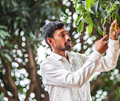
The government is developing a digital 'stack' of agricultural datasets, including land records at its core. Applications developed on top of the stack will give farmers advice on which seeds to buy and the best techniques for increasing production, as well as weather, agricultural loans, crop insurance, and other information. According to the government, this will also assist enhance farmers' income and improve agriculture sector's efficiency.
However, such a centralized stack will rely on outdated and erroneous land records; farmers' personal and financial information will be used in the absence of a strong data protection regulation, and rural regions have a low level of digital literacy. As a result, experts told IndiaSpend, such an 'AgriStack' is problematic.
What is “Agristack”?
-
It is a set of technology and digital databases geared toward farmers and the agriculture sector. AgriStack will provide a uniform platform for farmers to deliver end-to-end services throughout the agriculture food value chain.
-
It aims to provide a larger push to digitize data in India, ranging from land titles to medical records. Each farmer will receive a unique digital identification (farmers' ID) as part of the scheme, which will include personal information, information about the land they farm, as well as productivity and financial information.
-
Each ID will be linked to the individual's Aadhaar ID.
What are the potential benefits of Agristack?
Inadequate access to credit and information, insect infestation, crop waste, poor price discovery, and yield forecasts may all be adequately handled by the application of digital technology. It will also stimulate innovation and investment in the agriculture industry, as well as support research into more resilient crops.
What are the concerns related to the implementation of Agristack?
-
Absence of Data Protection Legislation: In the absence of regulations, it may wind up being an exercise in which private data processing firms know more about a farmer's land than the farmer himself, and they would be allowed to use farmers' information to whatever extent they desire.
-
Commercialization: The establishment of 'Agristack' would involve the commercialization of agricultural extension activities as they move into the digital and private sphere.
-
Absence of Dispute Settlement: The MoUs provide for physical verification of digitally collected land data, but there is no mention of what would happen if disagreements emerge, especially given that historical evidence shows that land disputes can take years to resolve.
-
Issues of Privacy and Exclusion: Because the proposed farmer ID would be Aadhaar-seeded, additional privacy and exclusion issues may arise. Furthermore, using land records as the foundation for the farmer database will exclude tenant farmers, sharecroppers, and farm laborers.
















